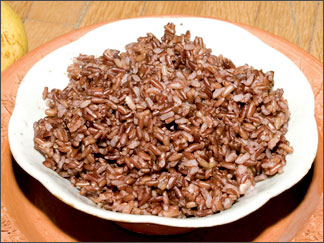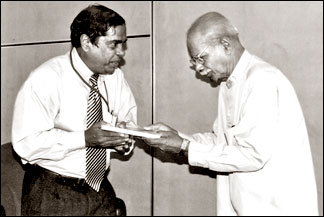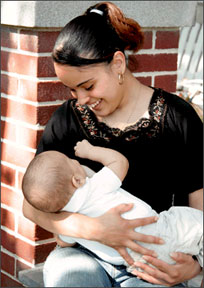|

Compiled and Coordinated by Edward Arambewala
American Heart Association Recommends
Red rice for heart health
 Dr. Sudheera Kalupahana, lecturer in the Peradeniya Medical Faculty,
currently in the States following a doctoral programme in Nutrition in
an article to us on - Healthy eating and an update on Dietary Fats
states that the American Heart Association in a recommendation on
reducing Cardiovascular disease has stated among other things. Dr. Sudheera Kalupahana, lecturer in the Peradeniya Medical Faculty,
currently in the States following a doctoral programme in Nutrition in
an article to us on - Healthy eating and an update on Dietary Fats
states that the American Heart Association in a recommendation on
reducing Cardiovascular disease has stated among other things.
"Consume whole grains and high-fibber foods e.g. Red Rice (which is
the staple food of most of us in Sri Lanka) to reduce the risk of heart
disease and maintain a healthy heart.
The recommendations in full is as follows:
(1) Consume a diet rich in fruits and vegetables
(2) Consume whole grains and high-fibber foods e.g. red rice
(3) Consume fish at least twice a week
(4) Limit the intake of saturated fats to less than 7% of energy,
trans-fats to 1% of energy and cholesterol to 300 m.g. per day.
(5) Reduce that intake of food and beverages with added sugar
(6) Reduce the amount of salt added to food
Responding to HealthWatch article
In her article Dr. Kalupahama states that, that her article is in
response to the HealthWatch article on 'Ceylon Medical Journal on
Coconut Fats' published on June 9, and she goes on -
Eating Healthy
I accidentally came across the article titled 'Ceylon Medical Journal
on Coconut Fats' in the Healthwatch of the Daily News published on June
9, and I thought that it is appropriate to provide some feedback on the
'Coconut oil debate' as a Nutrition science researcher and a medical
doctor. I would appreciate if you could publish this article for the
benefit of the general population of Sri Lanka.
During the past decade we have been so engrossed in the debate of
whether coconut oil is good or bad, that we have lost sight of the big
picture regarding the healthy eating habits in general. Eating healthy
not only reduces the risk of heart disease but also the risk of diabetes
and hypertension which along with high cholesterol and obesity are
termed as 'the metabolic syndrome'.
The American Heart Association has given the following
recommendations on diet to reduce the cardiovascular disease risk.
Of the recommendations I wish to elaborate and discuss limit the
intake of saturated fats to less than 7 per cent of energy with regards
to our current eating habits. What are the foods rich in saturated fat
in the Sri Lankan diet? One of the main would be coconut milk.
Although the use of coconut oil may have been reduced in recent
times, the use of coconut milk has remained unchanged. It is important
to realize that coconut milk has a lot of saturated fats.
Cows' milk is another major source of saturated fat. As most Sri
Lankans consume full-cream milk, it contributes highly to the saturated
fat content in the diet. In the United States only low fat (1 per cent)
or fat free milk is recommended for everyone above two years of age.
So we need to seriously think of switching to low fat milk or to give
up having milk in our tea! The other sources of saturated fats are meat
and meat products.
Transfats are present in hydrogenated oils and have been shown to
greatly increase the cardiovascular risk. They are mainly present in
commercially made solids fats of vegetable origin (e.g. solid
margarine). Foods containing transfats have been banned in many
countries including France and some States in the USA.
Cholesterol is only present in foods of animal origin. So don't be
impressed by the 'cholesterol free' statements on vegetable and coconut
oil labels. But the important thing to remember is that saturated fats
can
increase the cholesterol production inside the body. Egg yolk has a very
high content of cholesterol. A medium sized egg has about 200-250mg of
cholesterol which is near to the maximum recommended daily intake level.
So what can we do to eat healthy? The main point to realize is that we
have to cut down the fat intake. It is no good arguing whether coconut
oil
is good or bad. Too much of any oil is bad. So we should try to reduce
the
addition of coconut milk into food (it will be good for the purse too!),
to shift into non-fat milk (or to reduce the milk intake), to avoid
deep-fried food, to cut down the intake of beef and pork, to avoid solid
margarine and foods containing it like cake and to limit the intake of
egg
yolk. Switching into salads instead of oily vegetable curries is also a
good idea. Red raw-rice is an ideal whole-grain and high-fibber food.
Fish,
dried-fish (washed well to reduce salt), chicken (skin removed), soy
foods, pulses like dhal and mung-bean are nutritious and healthy when
cooked without coconut milk ('mirisata').
Eating healthy is not difficult and it could save you a lot of money
which you might
have to spend on healthcare costs later on your life (like on coronary
by-pass
surgery). So be smart and eat right!
Dr. Sudheera Kalupahana is a lecturer from the Peradeniya Medical
Faculty currently in the United States following a doctoral program in
Nutrition.
Blood pressure management in elderly
Dr. Terence Perera
I came across in the "News & Views" August 2007 issue of the Royal
College of Physicians and Surgeons Glasgow, an abstract from a talk
given by Professor David Stott of the Academic Section of Geriatric
Medicine at the Glasgow, Royal Infirmary on Blood Pressure Management in
Elderly at the recent symposium of Hong Kong Geriatric Society.
He had this to say - "Blood pressure levels in very elderly people
(this I believe are those above 80 years) have an apparently paradoxical
inverse relationship for future morbidity and mortality in very old
subjects; those with the highest blood pressure have the lowest
mortality and those with lowest levels have the highest death rates.
In contrast, in healthy young and middle aged subjects, blood
pressure has a direct and positive leaner association with
cardio-vascular events.
So why should older people tolerate low blood pressure differently
from young and middles aged subjects? The most plausible reason is the
dramatic increase in underlying coronary and cardiovascular disease with
ageing, requiring higher perfusion pressure to maintain adequate
coronary and cerebral blood flow."
He then, goes on to say that" the epidemiological data do not provide
a strong argument against use of anti-hypertensive drug treatment for
elderly people with persistently raised blood pressure.
There is convincing evidence from randomised controlled trials of
benefit with reductions of stroke risk, death from myocardial
infarction, and heart failure in older subjects, at least up to 80 years
of age.
Low blood pressure is, however, a potentially useful risk marker for
mortality in very elderly subjects, whether or not it is directly
causal.
This high-risk sub-group are likely to benefit from careful clinical
assessment, including the presence of underlying cardiac disease and
other serious co-morbidity, and consideration given to reducing or
stopping any anti-hypertensive drugs".
Acupressure a reliable disease preventive
|

Picture shows Mr. Karunasinghe presenting the first copy of the
book to the Ministry Secretary Asoka Malimage. |
A senior Attorney-at-Law Yasapala Karunasinghe, who has personally
found out how practising 'Acupressure' could act on a person as a strong
disease preventive, and lead for a healthy life, has recently launched a
Sinhala translation of a book on the subject written by an Indian doctor
Devendra Vora-Acupressure Health In your Hands.
Mr. Karunasinghe himself has done the translation, as he wanted the
large majority of the ordinary people in this country to benefit from
this hand technique, and lead healthy lives avoiding many of the common
ailments affecting the people today, to get over which they spend lot of
money and time.
The book was launched at Vishva Lekha Auditorium at Ratmalana at
which the Indigenous Medicine Ministry Secretary Asoka Malimage was the
Chief guest.
He was representing the Minister Tissa Karaliyadda who was unable to
be present owing to pressure of work.
Sarvodaya Leader Dr. A.T. Ariyaratne was the guest of honour at this
event. The Asst. Commissioner of Ayurvedha Dr. Amarasiri Ponnamperuma
was also present at this occasion. Both of them commended Mr.
Karunasinghe for bringing out this book.
Mr. Karunasinghe thanks Deshamanya Dr. Lalith Kotalawala for making a
financial grant for printing the book, which has enabled him to keep the
book price low.
OPA gives recognition to Healthwatch
The Organisation of Professional Associations of Sri Lanka (OPA) in
its News Bulletin for July 2007 has given recognition to this page,
placing it on the same category as the "Legal Aid" page and the "OPA-To
Serve The Public Page being carried weekly in the Daily News.
In page 6 of the OPA News Bulletin for the members in 2 news items
under the heading "OPA-To Serve The Public" page in the Daily News, the
OPA editor writes.
"This is on similar lines to the current print media column/pages in
the Daily News- "Legal Aid" and Medical Column (Healthwatch) Difference
being OPA being the apex body of all the professions will cover
questions in all the professions as well as subjects of common interest
to the public."
Healthwatch, while appreciating the OPA for giving this recognition
to this page, wish to recall, that the OPA under its presidency of
Architect, V.N.C. Gunasekera, in association with Healthwatch, honoured
Sri Lanka's oldest living centenarian at that time-Engo Nona (113 years)
at the OPA annual sessions in that year held at the BMICH.
Engo Nona was found by the Healthwatch in its "Centenarian Study"
project headed by Prof. Colvin Gunaratna of the Colombo Medical Faculty.
Nursing mothers who smoke harm babies' sleep
 Babies whose mothers smoke cigarettes before breast feeding sleep
less and not as well, according to a study published on Tuesday. Babies whose mothers smoke cigarettes before breast feeding sleep
less and not as well, according to a study published on Tuesday.
A test involving 15 nursing mothers found smoking "altered their
infants' sleep/wake patterning. Infants spent significantly less time in
active and quiet sleep and woke up from their naps sooner," the study
said.
Julie Mennella and other researchers at the Monell Chemical Senses
Center in Philadelphia said nicotine passed to the infants through
breast milk was the culprit. In the study published in the September
issue of Pediatrics, the journal of the American Academy of Pediatrics,
the women and their babies were monitored on days when they smoked and
on days when they did not.
On smoking days, the women were allowed 20 minutes to smoke in
another room just before breast-feeding. Some had just one cigarette
while others had two or three. The researchers said about 250 million
women worldwide smoke tobacco.
|

